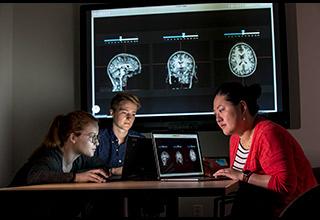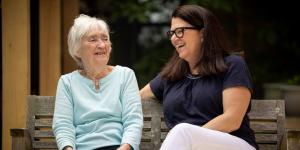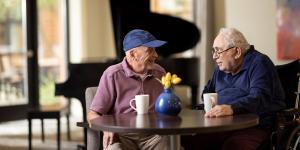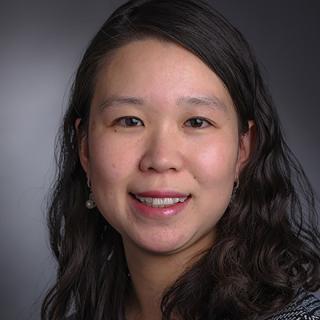Caring for the Whole Person After a Breast Cancer Diagnosis
Learn how new research is helping shape breast cancer care designed with older adults in mind.

Hearing the words “you have breast cancer” is life-changing at any age. The diagnosis can come with a unique set of challenges for older adults. Cancer symptoms, chronic health conditions, and treatment side effects often overlap and make care feel harder to manage.
That’s why geriatric-informed oncology and supportive services are so important — they ensure care is tailored to the whole person and aligned with what matters most during difficult times.
Older adults and breast cancer risk
Many public conversations about breast cancer revolve around younger women and the importance of prevention and early screening. While these are worthy topics, cancer is more likely to affect older adults. In fact, the median age of a breast cancer diagnosis is 63, and nearly 20% of women diagnosed are over the age of 75.
Older patients often have chronic conditions on top of their cancer diagnosis. According to the National Council on Aging, 79% of adults 65 and older have multiple chronic conditions. Some older patients are undertreated due to health care providers’ assumptions about their age or frailty, which can affect outcomes. Others may be overtreated, and their goals of care may get lost in the treatment process.
All of these factors show a clear need for cancer care that addresses not only the disease but also the unique needs of older adults. I see this every day in my work as a geriatrician.
As an associate physician at the Dana-Farber Cancer Institute, where I care for patients in the Program for Older Adults with Breast Cancer, and an assistant scientist at Hebrew SeniorLife’s Hinda and Arthur Marcus Institute for Aging Research, I am passionate about ensuring each of my patients’ treatment plans reflects who they are and what is important to them.
Advancing care for older adults with cancer
When someone is diagnosed with breast cancer, the treatment pathways can be complex. Surgery, radiation, chemotherapy, and long-term hormone therapy can all be harder to tolerate in older age. Side effects like fatigue, nausea, osteoporosis, or neuropathy may also cause complications.
While treating the cancer itself is essential, supportive care can be instrumental in maintaining quality of life and independence. That’s where a comprehensive geriatric assessment comes into play.
How geriatric assessments can shape treatment planning
The comprehensive geriatric assessment is an evaluation that helps doctors understand what care would be helpful for patients. It asks questions about overall health, daily function, and personal goals.
In the Program for Older Adults with Breast Cancer, every patient over 70 is offered this assessment at their first appointment. The questions focus on the 4Ms of an age-friendly health system: mentation, mobility, medication, and what matters.
Knowing this information helps the care team shape an individualized treatment plan that fits each person’s goals and needs. For example, geriatric assessments can help doctors flag if someone with breast cancer is at higher risk for harmful side effects from chemotherapy. If that’s the case, care teams can take steps to make treatment safer and easier on the body. They can work with the patient to prepare and try to prevent the side effects from being too severe.
Bringing supportive services to more patients
Even though geriatric assessments have clear benefits, they are not always easy to offer. Large hospital systems often have geriatricians on staff, but in smaller clinics or community settings, time, staffing, and resource constraints may make them harder to incorporate into everyday care.
I recently co-authored a study that explored the effectiveness of the Program for Older Adults with Breast Cancer’s care model. Program coordinators worked with patients to collect information on geriatric assessments through surveys and conversations.
Their responses guide referrals — whether to a geriatrician, social worker, pharmacist, or nutritionist. By starting this process at the first visit, we can immediately connect patients with supportive services, and their treatment plan is better informed.
However, many patients in the program do not participate in the assessment or follow up with their referrals.
Why additional care can feel hard to accept
While supportive services benefit patients, many people choose not to use them. In our study, fewer than half of the program participants completed their initial geriatric assessment. Among those that did, just over 60% accepted the offered referrals.
There are a few main reasons for this. Many people with cancer are already overwhelmed with their diagnosis and care plan. Adding another appointment or clinician may feel too much, especially as they focus on other aspects of care.
For younger patients in their sixties and seventies, the idea of geriatric care doesn’t always align with their identity. They might not feel “old enough” to need that type of care, leading them to turn down helpful services.
Patient education is another factor. Even when clinicians offer some background information about geriatric assessments, patients and their caregivers may not fully understand how it could help them. These findings reflect an opportunity to make supportive services feel more relevant. Our goal is to holistically support older adults with complex needs and their support systems throughout their care journeys.
We have identified some ways that can make additional care feel more accessible to patients:
- Offering the geriatric assessment online
- Revisiting the assessment with patients after the initial visit, when they might feel less overwhelmed
- Translating the geriatric assessment into different languages
- Embedding frailty screenings into all new patient questionnaires
- Reframing geriatric care through the lens of healthy aging
- Continuing communication about the value of referrals and extra support
The future of age-informed cancer care
Cancer treatment isn’t just about the disease — it’s about treating the whole person. Supportive care and geriatric-informed oncology can help align treatment plans with the diagnosis and the individual.
Research like this will help shift cancer care toward a whole-person approach, where supportive services are built in from the start of care and available to every patient. By learning from what works and what is challenging, we can pave the way toward age-friendly cancer care for patients in every setting.
At Hebrew SeniorLife, we believe aging should never prevent people from receiving compassionate, age-friendly care. Through our aging research at the Marcus Institute, we aim to uncover new ways to improve quality of life as we grow older, including how to better support people facing cancer.
Blog Topics
Learn More
Research on Aging
At the Hinda and Arthur Marcus Institute for Aging Research, Harvard Medical School-affiliated researchers are working to uncover answers to some of the most pressing challenges of aging.





